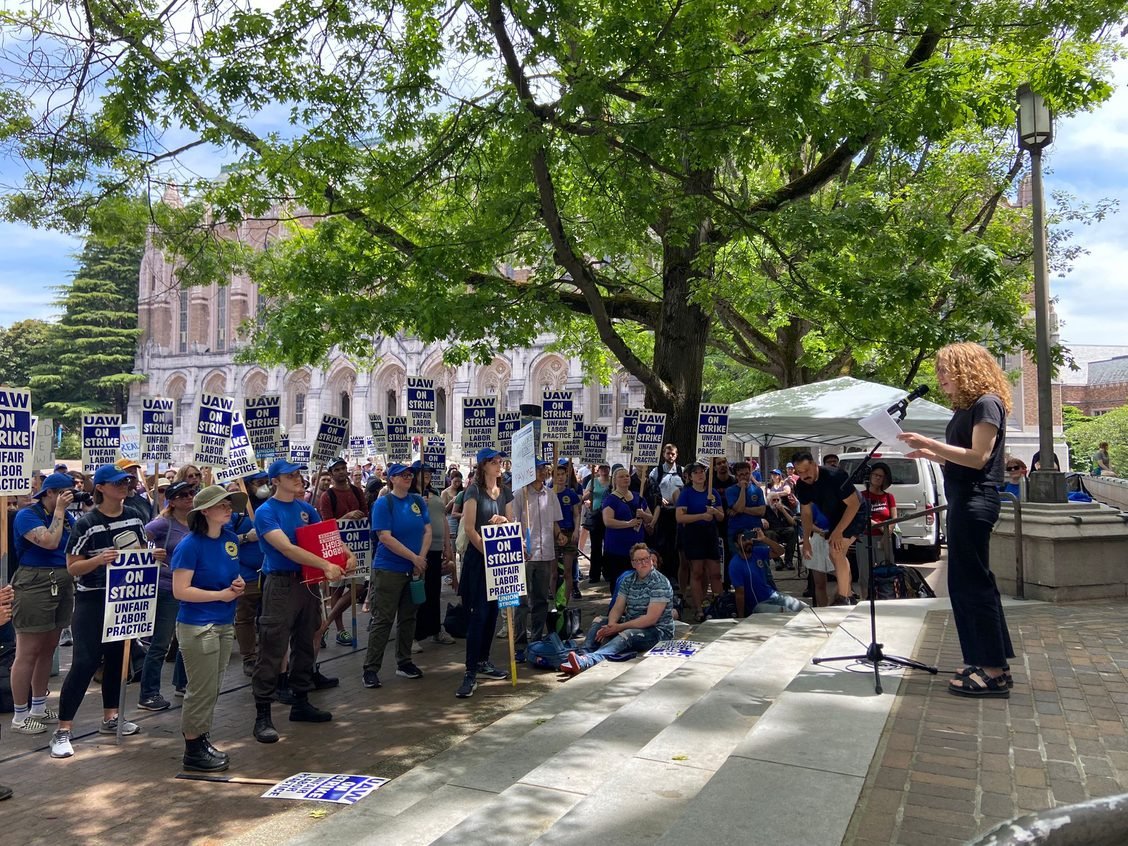UW workers on strike!
By Workers Strike Back. Published June 7, 2023
The academic worker revolt has now spread to the University of Washington (UW) in Seattle, where 2,400 workers went on strike today, including postdoctoral workers (postdocs) and research scientists.
The workers, represented by UAW 4121, are demanding living wages: a 30% raise for research scientists/engineers (RSEs) and $72,000 starting wage for postdocs. From fighting disease to space exploration to addressing the threat of climate change, the research at the University of Washington comes from thousands of academic workers putting in long hours.
80% of UAW 4121 members are considered “rent burdened,” a term that doesn’t fully capture the stress of paying on average 45% of their salaries on rent, leaving little to pay for other essentials. In just 10 years, Seattle rents increased an astounding 92 percent. These astronomical expenses lead many academic workers to conclude that they can’t afford to live in the city they work in, to start families, or even to continue doing the highly specialized research they’ve dedicated their entire careers to.
While UW has dragged out negotiations for a year and illegally denied raises to research scientists, they’re sitting on $8 billion in assets. The total compensation package of University of Washington President Cauce is a jaw-dropping $1.1 million per year, but it’s the workers who bring value to the university.
The University of Washington administration has a long track record of attacking workers on campus. When Socialist City Councilmember Kshama Sawant led the way on Seattle’s historic $15 minimum wage law in 2014, UW administrators tried to argue that it didn’t apply to them, and resisted raising the lowest paid workers on campus to the new minimum. UAW 4121, and many other campus unions joined forces alongside Councilmember Kshama Sawant to force UW to pay $15 an hour, which proves that when workers fight we can win!
From librarians with SEIU 925 to academic student employees with UAW 4121 to medical workers with the Resident & Fellow Physicians Union and KUOW workers with SAG-AFTRA, UW administration has repeatedly threatened workers while offering insultingly low wages.
UW is one of Seattle’s biggest bosses and they set a standard for other Seattle workers’ conditions and pay. It’s clear that UW plans to continue to use intimidation and threats to drive pay and conditions down for all workers. That’s why Workers Strike Back strongly supports UAW 4121’s strike.
In order to build for the strongest possible strike, it will be important to organize for wide community and student support to demand that UW serve the interests of working people and students, not cater to massive corporations like Microsoft, Alaska Airlines, and Blackstone.
That’s why together with Kshama Sawant we’ve donated $1,000 to the UAW 4121 strike fund and are inviting our supporters to the picket lines as early as 5 AM.
Local Democrats wrote a letter yesterday to the administration begging them to avert a strike, saying they are “deeply concerned about the disruption that this will cause for the UW.” While their letter calls for “a fair contract,” it is nonetheless striking that the Democrats are more concerned about a disruption to the status quo (which is sorely needed) than they are about the poverty wages being paid to workers at this university. What the Democrats failed to mention in their letter is that every single member of the UW Board of Regents was appointed by a Democratic governor, and all but one were appointed by self-described “progressive” Governor Jay Inslee.
We need a new party that will actually fight for working people. We need more independent working class representatives like Councilmember Kshama Sawant who helped launch Workers Strike Back and who is introducing legislation for strong rent control in Seattle later this month.
The strike at UW is part of an academic worker rebellion. From the University of Michigan, to the University of California, and Rutgers University, strikes are proving to be the essential tool to fight for higher wages and better conditions. Workers across the country are watching, and crucially need to draw out the lessons from each of these fights.
Strong, clear demands need to be front and center in any strike, and in the context of sky-high inflation UAW’s demand for a 30% wage raise is especially powerful. Building active community support from undergrads and faculty is also essential to build the necessary pressure on the university bosses.
Rebuilding a fighting labor movement means building a strong rank and file and wider solidarity. That’s why Workers Strike Back hits the picket line to support workers in their strike and to talk about next steps in their struggle.


